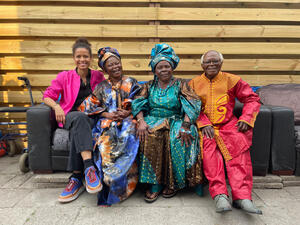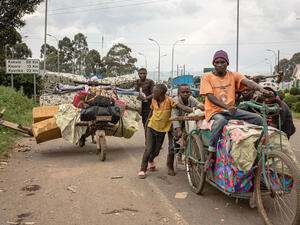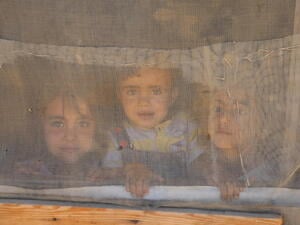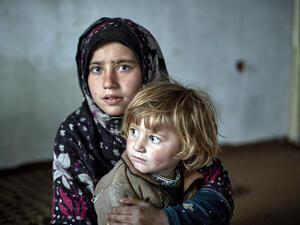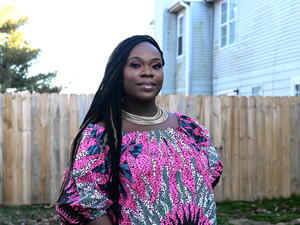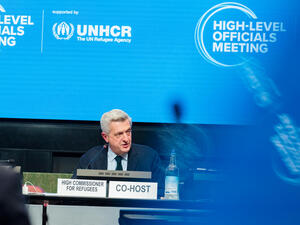Eritrean family leaves Tunisia border camp for new life in Belgium
Eritrean family leaves Tunisia border camp for new life in Belgium

Eritrean refugees Belaynesh and her twins in their tent in Tunisia's Choucha camp before they left for Belgium.
CHOUCHA CAMP, Tunisia, July 20 (UNHCR) - Filmon was born in Eritrea and says his heart is there, that he never dreamed nor wished to be far removed from his country. Yet this week he and his family boarded a plane and headed for a new life over 5,000 kilometres away.
"All I ever wanted was the taste of freedom, safety and an opportunity to continue learning," said the 29-year-old father of two.
His thirst for freedom and knowledge has been a driving force in his life. Forced to join the Eritrean army at the age of 19, he managed to complete a management degree at Asmara University and started working as a civil servant at the Ministry of Transport. But when he refused to spy on his colleagues' political leanings, he was arrested. Upon his release several months later, he decided to leave his country, fearing that his next detention would not end as quickly.
For the next four years, Filmon and his wife Belaynesh took a perilous journey across Ethiopia, Sudan and Libya. In each country, they tried to settle down and start anew. But being unregistered barred him from using his skills and qualifications, and subjected him to exploitation and the constant risk of deportation.
After over a year of struggling in Tripoli, Filmon, Belaynesh and their toddler twins Ebin and Ezer were registered as refugees with UNHCR in the Libyan capital. Nine months later, the Libyan conflict once again drove the family to flee, this time to Choucha camp in Tunisia, along with hundreds of thousands of other foreigners in Libya.
Since the start of the influx in February 2011, many Choucha residents originating from Asia and West Africa have been able to go home. But thousands of asylum-seekers and refugees like Filmon do not have the option of returning as it would put their lives in danger.
Life in Shousha is difficult. The camp is completely dependent on humanitarian aid, and subjected to crushing summer heat and sandstorms. A fire in May nearly destroyed the entire camp. Some 4,000 refugees there are losing hope, prompting UNHCR to call on the international community to act quickly.
"We are urging resettlement countries to provide more opportunities for these refugees, because resettlement constitutes a worthy solution for them and is in the spirit of burden sharing with Tunisia which has opened its doors to people fleeing the war in Libya despite its own delicate transition," said Nasir Fernandes, UNHCR's Senior Emergency Coordinator in Southern Tunisia.
Belgium was one of the first countries to respond. Following a cabinet decision in March, the State Secretary for Migration and Asylum, Melchior Wathelet, announced the transfer of 25 Choucha refugees to Belgium. "These people need protection, and I am proud that Belgium, like some other European countries, is taking its responsibilities," he said. "Providing protection to those who may benefit from it represents an international obligation, but a moral one too."
Back in Choucha, the loss of hope brings the temptation of desperate measures. Filmon admits that he considered crossing the Mediterranean with smugglers. "I did think about it, although I have many friends who were lost at sea. But I could not let my family take the risk," he said.
Just days before his flight from Tunis to Brussels, Filmon was still too busy to think of the future. He was making sure his departure would not affect fellow refugees he had been helping - both as community leader and as an interpreter working with UNHCR to interview and register refugees to help them find a way out of the camp.
Now, Filmon and his family, along with six other families from Eritrea, the Democratic Republic of the Congo and Somalia, have left to start a new life. Soon, more refugee families will be leaving for Norway. Perhaps their departures will bring some measure of hope to those still languishing in the tents of Choucha.
By Carole Laleve in Choucha camp, Tunisia


